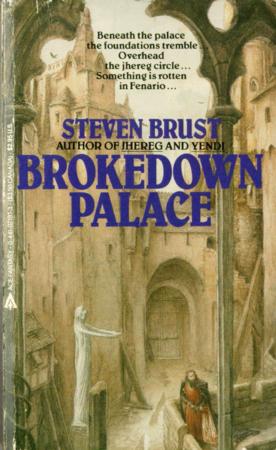Brokedown Palace was the first Brust I read. I’d heard him well spoken of online, and I couldn’t quite bring myself to pick up the extremely ugly British edition of the first three Vlad books, and this was in the library. It was an unusual place to start with Dragaera, but not a terrible one. It’s a very odd book, and it was very odd of Brust to write it after Yendi and before Teckla. It’s set in the East, in Fenario, and you wouldn’t know it was Dragaera at all except that it clearly is. It’s written like a fairytale—and it’s punctuated with things written even more like fairytales. It draws on Brust’s Hungarian background, and it’s connected to the Grateful Dead song “Brokedown Palace.”
I really like this book and I thoroughly enjoyed reading it, but it’s so dreamlike and odd that I find it very difficult to talk about coherently. It’s like trying to pick up fragments of mist. Brilliant book. Very weird.
It’s about a family of brothers who live in the kingdom of Fenario, on the borders of Faerie. The eldest, Laszlo, is the king, and he beats up the youngest, Miklos, because Miklos mentions that the palace is falling down. Dying, Miklos slips into the River that flows out of Faerie, and one of the great powers of the land. Then he meets a talking horse and after that it gets weird. The book is a fairytale about brothers, death, life, renewal, magic, love and keeping norska. (Norska are rabbits. Rabbits like the rabbit in Monty Python and the Holy Grail. I instantly recognised that as a norska the first time I saw the film.)
This book is undoubtedly a fairytale. It’s also undoubtedly set in Dragaera which is easily seen as science-fictional. The orange overcast that covers the Empire is here as the “hand of Faerie” and in the same way the magic here is infinitely more magical. There’s a lot less of it. In the Vlad books, people routinely make psionic communication and raise the dead. Here a bit of magical healing is very unusual. But what there is, isn’t taken for granted, isn’t routine, is magical perhaps even magical realist—there’s a taltos horse (which raises questions about why Vlad is called “taltos”) that can talk, there’s a tree that becomes a palace, and a river with an agenda. All the magic in the Vlad books can be categorized, repeated, relied on. Here, none of it can.
I find myself reading it now with double vision. Looked at one way Miklos goes into Faerie and labours for two years and comes back as a wizard. Looked at another he goes into the Empire, becomes a Teckla, gets a perfectly ordinary connection to the Orb and learns a little sorcery. There’s the whole thing of killing Verra and stopping sorcery from working. It’s a very weird book, and I suspect it contains some keys to the universe if only I could see them clearly. Certainly, starting here I never had any confusion about the overcast, that the Furnace is the sun and that you never see clear sky.
The book starts with the legend of Fenarr, which is seen from the Dragaeran side in The Phoenix Guards. This is clearly the same incident, the same set of events, seen through that doubled vision—from the Eastern side it’s ringed about with fantasy, mist, legend, magic, from the Dragaeran side it’s a clever bit of diplomacy. This may have something to do with the length of time an Easterner lives. Fenarr is a legend in Fenario, but “Lord Kav” with whom he arranged the peace, is still alive.
It doesn’t say so in the book, but I have heard as extra-canonical information that Brigitta’s baby (the one people will have to look out for) is Cawti. Interesting if true, and a bit mind-boggling.
Jo Walton is a science fiction and fantasy writer. She’s published eight novels, most recently Half a Crown and Lifelode, and two poetry collections. She reads a lot, and blogs about it here regularly. She comes from Wales but lives in Montreal where the food and books are more varied.










